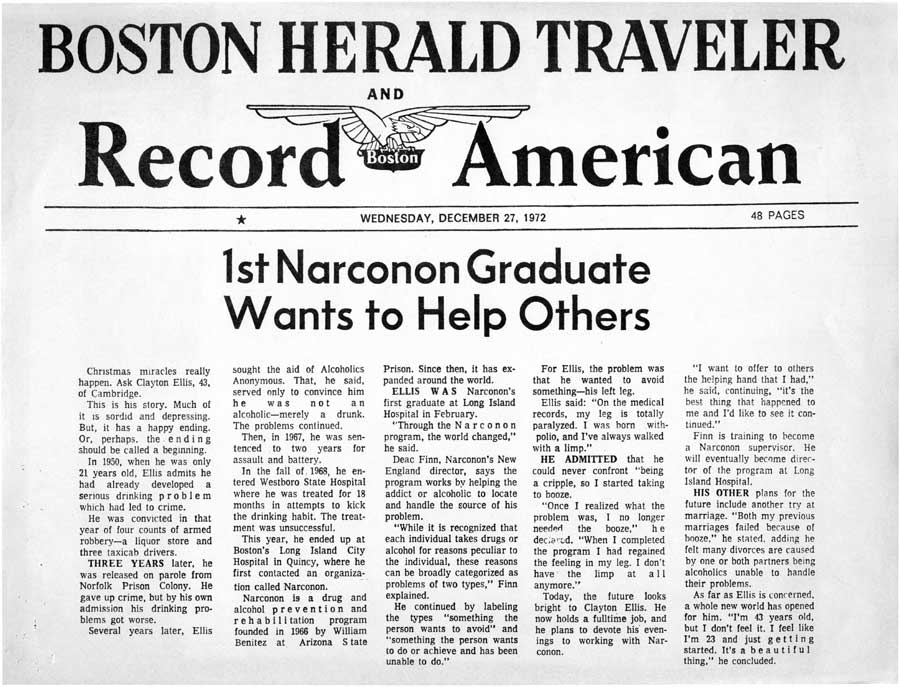1st Narconon Graduate Wants to Help Others

Boston Herald Traveler and Boston Record American
December 27, 1972
Christmas miracles really happen. Ask Clayton Ellis, 43, of Cambridge.
This is his story. Much of it is sordid and depressing. But, it has a happy ending. Or, perhaps, the ending should be called a beginning.
In 1950 when he was only 21 years old, Ellis admits he had already developed a serious drinking problem which had led to crime.
He was convicted in that year of four counts of armed robbery - a liquor store and three taxi drivers.
THREE YEARS later, he was released on parole from Norfolk Prison Colony. He gave up a life of crime, but by his own admission his drinking problems got worse.
Several years later, Ellis sought the aid of Alcoholics Anonymous. That, he said, served only to convince him he was not an alcoholic - only a drunk. His problems continued.
Then in 1967, he was sentenced to two years for assault and battery.
In the fall of 1968, he entered Westboro State Hospital was treated for 18 months in attempts to kick the drinking habit. The treatment was unsuccessful.
This year, he ended up at Boston’s Long Island City Hospital in Quincy, where he first contacted an organization called Narconon.
Narconon is a drug and alcohol prevention and rehabilitation program started in 1966 in Arizona State Prison. Since then, it has expanded around the world.
Ellis was Narconon’s the first graduate at the Long Island Hospital in February.
“Through the Narconon program the whole world changed,” he said.
Deac Finn, Narconon’s New England Director, says the program works by helping the addict or the alcoholic locate and handle the source of his problem.
“While it is recognized that each individual takes drugs or alcohol for reasons peculiar to the individual, these reasons can be broadly categorized as problems of two types,” Finn explained.
He continued by labeling the types “something the person wants to avoid” and something the person wants to do or achieve and has been unable to do.”
For Clayton Ellis, his problem was that he wanted to avoid something: his left leg.
Ellis said: “On the medical records, my leg is totally paralyzed,” said Clayton. “I was born with polio, and I’ve always walked with a bad limp.”
He admitted that he never could confront “being a cripple, so I started taking to booze.
“Once I realized what the real problem was, I no longer needed the booze,” he declared. “When I completed the program, I had regained the feeling in my leg. I don’t have the limp at all anymore.”
Today, the future looks bright to Clayton Ellis. He now holds a fulltime job and plans to devote his evenings to working with Narconon.
“I want to offer to others the helping hand that I had,” he said, continuing, “it’s the best thing that happened to me and I’d like to see it continued.”
Finn is training to become a Narconon Supervisor. He will eventually become the director of the program at Long Island City Hospital.
His other plans for the future include another try at marriage. “Both my marriages failed because of booze,” he stated, adding he felt many divorces are caused by one or both partners being alcoholics unable to handle their problems.
As far as Clayton Ellis is concerned, a whole new world has opened for him. “I’m 43 years old, but I don’t feel it. I feel like I’m 23 years old and just getting started. It’s a beautiful thing,” he concluded.
More Articles from 1972: